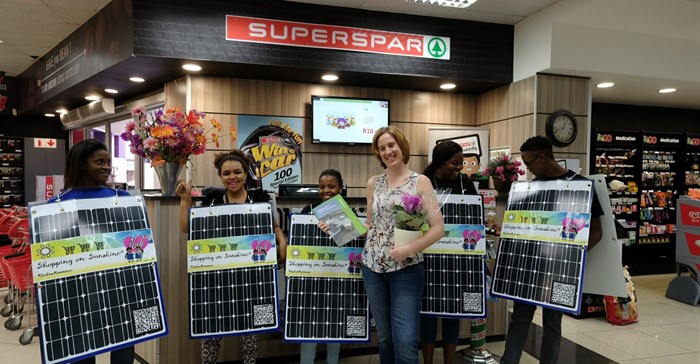In order to fully benefit from the potential of abundant renewable energy in South Africa, companies need to step out of their comfort zones and send clear signals to the markets by committing to an ambitious 100% renewable energy future.

Photo credits: Greenpeace/Shayne Robinson
This is the resounding message in the second iteration of the report Shopping clean: Retailers and renewable energy – An Update released by Greenpeace Africa which gives an up-to-date outline of the state of renewable energy investments and commitments by South Africa’s top five retailers - Pick n Pay, Shoprite, Woolworths, Spar and Massmart.
Six-month check in
The Renewable Energy Champions campaign was first launched in April this year and the update takes a look at how the retailers have improved in the intervening six months.
“When comparing the retailers to one another, Woolworths is still in the lead with an improved score of six out of 10. Massmart is close behind Woolworths with a score of five and a half, a significant improvement from their April score. “
“Pick n Pay has also shown a significant improvement and is now engaging with Greenpeace on how they can increase their commitments to renewable energy in the future. Spar and Shoprite are at the bottom of the table with Shoprite scoring the lowest of all five retailers,” said Penny-Jane Cooke, climate and energy campaigner for Greenpeace Africa.
Solar installation
During 2016, both Woolworths and Massmart undertook solar PV installations; with Woolworths installing the first phase of its 2MW system at their Midrand distribution centre, and Massmart installing a 520kW and a 430kW system at their Carnival Mall and Woodmead Makro stores respectively. This combined solar PV capacity is sufficient to power 500-700 average South African households.
“One of the most significant actions undertaken by Massmart, Woolworths and Pick n Pay this year was their commitment to lobby to remove the barriers to renewable energy. The retailers have agreed to the need for a holistic sector approach that includes financial mechanisms and regulatory frameworks to create an enabling framework for renewable energy going forward, and have agreed to focus on lobbying for this, meanwhile Woolworths alone has taken the important step of committing to a 100% renewable energy future,” continued Cooke.
Spar and Shoprite drag their heels
At the bottom end of the updated ranking table both Spar and Shoprite are dragging behind their fellow retailers. Spar’s score has stayed the same as they have not made any progress in the renewable energy sector in 2016. Shoprite continues to have the lowest score of three out of 10 due to a lack of publicly available information, lack of transparency and unwillingness to engage with Greenpeace on these issues
“Shoprite’s sustained low score is a clear indication that the retailer is not yet taking renewable energy seriously, neither are they engaging with the Renewable Energy Champions campaign. Greenpeace believes that Shoprite in particular can do much more to show solar some love, and we call on all five of the country’s top retailers to convert their scores from average to ambitious,” added Cooke.
During the course of 2016, Eskom has begun what appears to be a sustained anti renewable energy campaign, which means there is an increased need for other sectors, including the retail sector, to champion and lobby for a renewable energy future in South Africa. Renewable energy offers a concrete alternative to the current electricity system that is failing all South Africans.






























